
 |
lets play a game
i had a lot of fun last night, but i am not quite as good as i used to be (or never was very good) but i think we can have fun another way.
i propose a game. this post is the start. somone or anyone reply to this with the following: i bet george.....sucks cock (or whatever you can think of) and then everyone or anyone replies with the same thing for the person above them: i bet thrasho.....eats pussy (or whatever) and so on. speed and brevity are the object. i will send the funniest person a gift (for realz). we can figure out some way to vote or whatever. you must reply to everyone that says somehing about you, and the person above you when you go to post. it should be interesting at least. |
I bet (know :\) George has shit stains
|
i bet bubbles likes the way my shit stains smell.
|
I bet Georges shit stains resent him in every way
|
I bet bubbles.... has a real silly hat :)
|
I bet ThreshO has really dreamy eyes ahhhhh
|
i bet thrasho has supple nipples
i bet bubbles has a donkey |
I bet this is pretty dumb.
|
i bet F0 can suck a fat babies dick
|
I bet that fathom zero is too generous with that statement.
|
I bet Grislygus is correct (falling asleep)
|
i bet bubble better wake the fuck up or she is gonna get spanked
:explode |
I bet George can make it better BRING IT >:
|
i bet bubbles got what she desrved >: twice!!
|
i bet george will never let this thread die!!!
i bet george thinks FUCK YOU ALL >: |
I understand that george loves the feel of a swarthy man's cock
|
George- Thats all you got you look like you got fucked in the mouth by a wild chimp once i met your mother I realized its just you
|
i bet F0 probabbly disappointed the fat baby when he sucked its cock.
i bet bubbles is gonna get the whiskey bottle tonight. |
Zero you cant blame him who doesn't?
|
what does that sentence even mean
you suck so unbelievably hard, people you've never even spoken to want to kill themselves. |
side note man I love whiskey and its vessel
|
i bet FO is gonna make me cry.
i bet bubbles loves puppies, kittens, and serving our lord jesus with blowjobs :( |
I cant handle another night of crying thanks to ThrashO
Everyone worships in their own unique way |
i bet you can't play guitar, you bag of suck
|
i bet you bore the fuck out of everyone by playing the same goddamn song every chance you get.
|
bag of suck:lol
|
I bet you'll shine my shoes and heed my words soon enough, geotrge
|
i bet you have no idea the lengths i will go to polish your sorry ass off.
|
I bet Kevin Pollak can't save you now
|
i bet i was eating chicken wings and have no fucking idea who kevin pollack is.
|
I bet you two are as funny in real life as you are on here.
|
i bet you wish you could hang out and be funny with us.
|
I bet you're an affable guy
|
i bet you are handsome.
|
I bet people will forget about you again, yawnsville
|
he would be affable towards you ;)
|
I bet you jaywalk when the light's green asshole
|
 I bet Zero likes the lady to be in charge |
i bet you get eaten by an alligator :)
|
Quote:
I bet you've got a maggot in your gormless brain |
i bet neither of us knows what gormless means :(
i bet this thread is a complete failure, but that something good will come of it. |
George I think we are bigger losers then expected. The one friend we thought we had in this shithole town is an 1hr 1/2 late for our party. What to do with 40 wings?
|
I bet creeposaurus smells the ass of people to get to know them
|
WTF howd you know that??
I BET BUBBLES ISN'T REALLY A BUBBLE |
i bet you are right bubbles :(
i bet he will come over while i am working tomorrow night and want to make smiles on the couch with you :angry |
I bet bubbles like's kitties! :)
          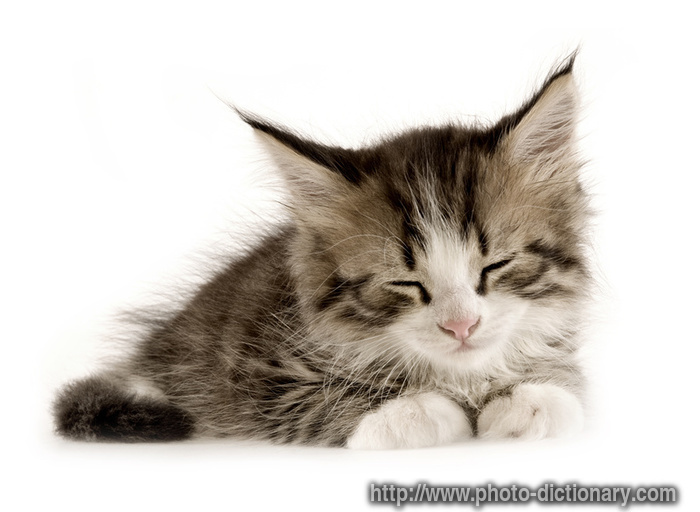  |
 |
locking doors and 100lbs Baby is in charge
|
People like you. Why? I have no idea.
|
Quote:
|
Code:
fuck you guys |
I bet no one remembers your kitty posts and you need to post them again
|
Quote:
|
i bet life couldn't be sadder right now
|
i bet it could.
and i bet thrasho could eat 40 wings and still have room left for pudding :love |
i bet there's blue cheese for those wings
|
I bet people all over the world would feel better if george and bubbles killed themselves.
|
homemade!
|
our one friend that didn't show will be all torn up
|
Quote:
THESE ONES \/             AND ONE BECAUSE LOOK :lol \/  IF I HAD KITYT WIT GUN I GIV THE BARETT ITS THE BEST HERES MORE ABOUT IT   I NOE I DID GUNS BEUT DONT FORGET THE CITTYS             |
I PUT ON FOR MY KITTY, ON ON FOR MY KITTY
|
I forgot about thrashoh
|
Quote:
 |
george once burned his ass while lighting a fart
|
Quote:
|
hehe
|
 Bubble burned George's ass lighting his fart |
i ebt this is sparta!
 |
Quote:
A monarch is the person who heads a monarchy. This is a form of government in which a state or polity is ruled or controlled by an individual who typically inherits the throne by birth and normally rules for life or until abdication. Monarchs may be autocrats (absolute monarchy) or ceremonial heads of state who exercise little or no power or only reserve power, with actual authority vested in a parliament or other body (constitutional monarchy). Contents [hide]
The word monarch is derived from the Greek μονάρχης (from μόνος, "one/singular," and ἄρχων, "leader/ruler/chief" through the {[Latin]]: monarcha (mono: "one" + arch "chief") which referred to a single, at least nominally, absolute ruler. In current usage the word monarchy generally refers to a traditional system of hereditary rule, as elective monarchies are rare in the modern period. [edit] Characteristics Most states have at most one monarch at any given time, although a regent may rule when the monarch is a minor, not present, or otherwise incapable of ruling. Two monarchs have ruled simultaneously in some countries, as in the ancient Greek city-state of Sparta or the joint sovereignty of spouses or relatives (e.g. William and Mary of Kingdom of England and Scotland, Peter and Ivan of Russia, Charles and Joanna of Castile, etc.). Monarchs have various titles — king or queen, prince or princess (e.g. Sovereign Prince of Monaco), Malik or Malikah (e.g. Maliks of Middle eastern Mamlakahs). emperor or empress (e.g. Emperor of Japan, Emperor of India), Shah of Iran, archduke, duke or grand duke (e.g. Grand Duke of Luxembourg). Prince is sometimes used as a generic term to describe any monarch regardless of title, especially in older texts. Many monarchs are distinguished by titles and styles. They often take part in certain ceremonies, such as a coronation. Monarchy is associated with political or sociocultural in nature hereditary rule; most monarchs, both historically and in the modern day, have been born and brought up within a royal family (over a period of time called a dynasty) and trained for future duties. Different systems of succession have been used, such as proximity of blood, primogeniture, and agnatic seniority (Salic law). While traditionally most monarchs have been male, female monarchs have also ruled in history; the term queen regnant refers to a ruling monarch, as distinct from a queen consort, the wife of a reigning king. Some monarchies are non-hereditary. In an elective monarchy, the monarch is elected but otherwise serves as any other monarch. Historical examples of elective monarchy include the Holy Roman Emperors (chosen by prince-electors but often coming from the same dynasty) and the free election of kings of the Polish–Lithuanian Commonwealth. Modern examples include the Yang di-Pertuan Agong of Malaysia and the pope of the Roman Catholic Church, who serves as Sovereign of the Vatican City State and is elected to a life term by the College of Cardinals. Monarchies have existed throughout the world, although in recent centuries many states have abolished the monarchy and become republics. Advocacy of republics is called republicanism, while advocacy of monarchies is called monarchism. The principal advantage of hereditary monarchy is the immediate continuity of leadership, with a usually short interregnum (as illustrated in the classic phrase "The [old] King is dead. Long live the [new] King!"). However, this only applies in the case of autocratic rule. In cases where the monarch serves mostly as a ceremonial figure (e.g. most modern constitutional monarchies) real leadership does not depend on the monarch. A form of government may in actual fact be hereditary without being considered monarchy, such as family dictatorship or political families present in some nominally democratic countries. A particular case is the French co-prince of Andorra, a position held by the elected President of France. Nonetheless, he is still generally considered a monarch because of the traditional use of a monarchical title (even though Andorra is, strictly speaking, a diarchy.) Similarly, the Yang di-Pertuan Agong of Malaysia is considered a monarch despite only holding the office for five years at a time. On the other hand, several life-time dictators around the world have not been formally classified as monarchs, even if succeeded by their children, but that may be more to do with international political sensitivities than with semantics. Hereditary succession within one family has been most common. The usual hereditary succession is based on some cognatic principles and on seniority, though sometimes merit has played a part. Thus, the most common hereditary system in feudal Europe was based on cognatic primogeniture where a lord was succeeded by his eldest son or, if he had no son, by either daughters or sons of daughters. The system of tanistry was semi-elective and gave weight also to merits and capability. The Quasi-Salic succession provided firstly for male members of the family to succeed, and secondarily males descended from female lines. In most feudal fiefs, females (such as daughters and sisters) were allowed to succeed, should the male line fail, but usually the husband of the heiress became the real lord and most often also received the title, jure uxoris. Great Britain and Spain today continue this model of succession law, in the form of cognatic primogeniture. In more complex medieval cases, the sometimes conflicting principles of proximity and primogeniture battled, and outcomes were often idiosyncratic. As the average life span among the nobility increased (thanks to lords limiting their personal participation in dangerous battles, and generally improved sustenance and living conditions among the wealthy), an eldest son was more likely to reach majority age before the death of his father, and primogeniture became increasingly favoured over proximity, tanistry, seniority and election. Later, when lands were strictly divided among noble families and tended to remain fixed, agnatic primogeniture (practically the same as Salic Law) became more usual: the succession would go to the eldest son of the monarch, or, if the monarch had no sons, the throne would pass to the nearest male relative through the male line, to the total exclusion of females. In some countries however, inheritance through the female line was never wholly abandoned, so that if the monarch had no sons, the throne would pass to the eldest daughter and to her posterity. (This, cognatic primogeniture, was the rule that let Elizabeth II become Queen.) In 1980, Sweden became the first monarchy to declare equal primogeniture or full cognatic primogeniture, meaning that the eldest child of the monarch, whether female or male, ascends to the throne.[1] Other kingdoms (the Netherlands in 1983, Norway in 1990, Belgium in 1991 and Denmark in 2009) have since followed suit. In some monarchies, such as Saudi Arabia, succession to the throne usually first passes to the monarch's next eldest brother, and only after that to the monarch's children (agnatic seniority). In some other monarchies (e.g. Jordan), the monarch chooses who will be his successor, who need not necessarily be his eldest son. Whatever the rules of succession, there have been many cases of a monarch being overthrown and replaced by a usurper who would then often install his own family as the ruling monarchy. Further information: Monarchy  This section requires expansion. This section requires expansion.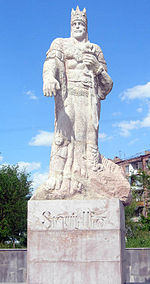  Tigranes the Great, monarch of Armenia from 95 BC to 55 BC Further information: Monarchies in Africa Further information: History of Africa A series of Pharaohs ruled Ancient Egypt over the course of three millennia (circa 3150 BC to 31 BC) until it was conquered by the Roman Empire. In the same time period several kingdoms flourished in the nearby Nubia region, with at least one of them, that of the so-called A-Group culture, apparently influencing the customs of Egypt itself. West Africa hosted the Kanem Empire (700 - 1376) and its successor, the Bornu principality which survives to the present day as a part of the Federation of Nigeria. In East Africa, the Aksumite Empire and later the Ethiopian Empire (1270-1974) were ruled by a series of monarchs. Haile Selassie, the last Emperor of Ethiopia, was deposed in a communist coup. Central and Southern Africa were largely isolated from other regions until the modern era, but they did later feature kingdoms like the Kingdom of Kongo (1400–1914). As part of the Scramble for Africa, Europeans conquered, bought, or established African kingdoms and styled themselves as monarchs. Currently the African nations of Morocco, Lesotho and Swaziland are sovereign monarchies under dynasties that are native to the continent. Places like St. Helena, Ceuta, Melilla and the Canary Islands are ruled by the Queen of the United Kingdom of Great Britain and Northern Ireland and the King of Spain, while so-called sub-national monarchies of varying sizes can be found all over the rest of the continent e.g. the Yoruba city-state of Akure in south-western Nigeria is something of an elective monarchy, with its reigning Oba having to be chosen by an electoral college of nobles from amongst a finite collection of royal princes and princesses of the realm. Monarchs in Europe   Queen of United Kingdom Further information: Monarchies in Europe Prince was a common title within the Holy Roman Empire, along with a number of higher titles listed below. Such titles were granted by the Emperor, while the titulation of rulers of sovereign states was generally left to their own discretion, most often choosing King or Queen. Such titulations could cause diplomatic problems, and especially the elevation to Emperor or Empress was seen as an offensive action. During the nineteenth and twentieth centuries most small monarchies in Europe disappeared, merging to form larger entities, and so King the most common title for male rulers and Queen has become the most common title today for female rulers. As of 2010[update] in Europe there are twelve monarchies: seven kingdoms, one grand duchy, one papacy, and two principalities, as well as the diarchy of Andorra. In China, before the abolition of the monarchy in 1912, the Emperor of China was traditionally regarded as the ruler of "All under heaven". "King" is the usual translation for the term wang 王, the sovereign before the Qin dynasty and during the Ten Kingdoms period. During the early Han dynasty, China had a number of small kingdoms, each about the size of a county and subordinate to the Empress or Emperor of China. The Japanese monarchy is now the only monarchy to still use the title of Emperor. Between 1925–1979, Iran was ruled by an Emperor that used the title of "Shahanshah" (or "King of Kings" in Persian). Thailand and Bhutan are like the UK in that they are constitutional monarchies ruled by a King. Saudi Arabia and many other middle eastern monarchies are ruled by a Malik and parts of the United Arab Emirates, such as Dubai, are still ruled by monarchs. Oman is led by Monarch Sultan Qaboos bin Said Al Said. The Kingdom of Jordan is one of the Middle East's more modern monarchies is also ruled by a Malik. In Arab and arabized countries, Malik (absolute King) is absolute word to render a monarch and is superior to all other titles. Nepal abolished their monarchy in 2008. Sri Lanka had a complex system of monarchies from 543BC to 1815. Between 47BC-42BC Anula of Sri Lanka became the country's first ever female head of state as well as Asia's first head of state.[dubious – discuss] In Malaysia's constitutional monarchy, the Yang di-Pertuan Agong (The Supreme Lord of the Federation) is de facto rotated every five years among the nine Rulers of the Malay states of Malaysia (those nine of the thirteen states of Malaysia that have hereditary royal rulers), elected by Majlis Raja-Raja (Conference of Rulers). Under Brunei Darussalam's 1959 constitution, His Majesty Paduka Seri Baginda, Sultan Haji Hassanal Bolkiah Mu'izzaddin Waddaulah is the head of state with full executive authority, including emergency powers, since 1962. The Prime Minister of Brunei is a title held by the Sultan of Brunei. As the prime minister, the Sultan presides over the cabinet. Monarchs in the Americas Further information: Monarchies in the Americas The concept of monarchy existed in the Americas long before the arrival of European colonialists.[2][3] When the Europeans arrived they referred to these tracts of land within territories of different aboriginal groups to be kingdoms, and the leaders of these groups were often referred to by the Europeans as Kings, particularly hereditary leaders.[4] Many of the leaders were queens, but this was not understood by the Europeans, who had no knowledge of the indigenous history or languages, much less an understanding of matrilineality The first local monarch to emerge in North America after colonization was Augustin I, who declared himself Emperor of Mexico in 1822. Mexico again had an emperor, Maximilian I from 1863 to 1867. In South America, Brazil had a Portuguese royal house ruling as emperor between 1822 and 1889, under Emperors Pedro I and Pedro II. These American emperors were deposed due to complex issues, including pressure from the highly republican United States, which had declared itself independent of the British monarch in 1776. The British, worried about U.S. colonial expansion, invasion following the American Civil War, and the fact that the U.S. had aided the Mexican republican rebels in overthrowing Maximilian I, pushed for the union of the Canadian provinces into a country in 1867. With Confederation, Canada became a self-governing nation which was considered a kingdom in its own right,[5] though it remained subordinate to the United Kingdom; thus, Victoria was monarch of Canada, but not sovereign of it. It was not until the passing of the Statute of Westminster that Canada was considered to be under a distinct Canadian Crown, separate to that of the British, and not until 1953 that the Canadian monarch, at the time Elizabeth II, was titled by Canadian law as Queen of Canada. Between 1931 and 1983 nine other previous British colonies attained independence as kingdoms, all, including Canada, in a personal union relationship under a shared monarch. Therefore, though today there are legally ten American monarchs, one person occupies each distinct position. |
NOPE
Post it again Thrash, I forgot |
I bet I could download a video of bubbles and george's 3 person party off of any random tube pr0n site in the next 4 hours
I bet Thrsh0 has genital warts I bet I get roasted hardcore in the next few posts |
 licked that once |
I bet why would you do that to yourself, 5garn?
|
Quote:
|
Pentegarn your just a mean old man if I could throw shit at you right now I would
|
Pentegarn "I tasted of Werther's Originals and Metamucil" so you licked it too?
|
Quote:
|
Quote:
:queen'svoice "Come and lick the royal snatch!" |
Quote:
Europe (pronunciation: /ˈjʊəɹəp/ yewr-əp; /ˈjuɹəp/ or /ˈjəɹəp/ yur-əp[1]) is, by convention, one of the world's seven continents. Comprising the westernmost peninsula of Eurasia, Europe is generally 'divided' from Asia to its east by the watershed divides of the Ural and Caucasus Mountains, the Ural River, the Caspian and Black Seas, and the waterways connecting the Black and Aegean Seas.[2] Europe is bordered by the Arctic Ocean and other bodies of water to the north, the Atlantic Ocean to the west, the Mediterranean Sea to the south, and the Black Sea and connected waterways to the southeast. Yet the borders of Europe—a concept dating back to classical antiquity—are somewhat arbitrary, as the primarily physiographic term "continent" can incorporate cultural and political elements. Europe is the world's second-smallest continent by surface area, covering about 10,180,000 square kilometres (3,930,000 sq mi) or 2% of the Earth's surface and about 6.8% of its land area. Of Europe's approximately 50 states, Russia is the largest by both area and population (although the country has territory in both Europe and Asia), while the Vatican City is the smallest. Europe is the third-most populous continent after Asia and Africa, with a population of 733 million or about 11% of the world's population.[3] In 1900, Europe's share of the world's population was 25%.[4] Europe, in particular Ancient Greece, is the birthplace of Western culture.[5] It played a predominant role in global affairs from the 16th century onwards, especially after the beginning of colonialism. Between the 16th and 20th centuries, European nations controlled at various times the Americas, most of Africa, Oceania, and large portions of Asia. Both World Wars were largely focused upon Europe, greatly contributing to a decline in Western European dominance in world affairs by the mid-20th century as the United States and Soviet Union took prominence.[6] During the Cold War, Europe was divided along the Iron Curtain between NATO in the west and the Warsaw Pact in the east. European integration led to the formation of the Council of Europe and the European Union in Western Europe, both of which have been expanding eastward since the fall of the Soviet Union in 1991. Contents [hide]
Further information: List of countries spanning more than one continent Further information: Borders of the continents   Reconstruction of Herodotus' world map   A medieval T and O map from 1472 showing the division of the world into 3 continents 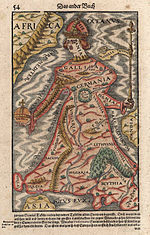  Europa regina map from Münster (1570). The British Isles and Scandinavia are not included in Europe proper. The use of the term "Europe" has developed gradually throughout history.[7][8] In antiquity, the Greek historian Herodotus mentioned that the world had been divided by unknown persons into the three continents of Europe, Asia, and Libya (Africa), with the Nile and the River Phasis forming their boundaries—though he also states that some considered the River Don, rather than the Phasis, as the boundary between Europe and Asia.[9] Europe's eastern frontier was defined in the 1st century by geographer Strabo at the River Don[10] Flavius and the Book of Jubilees described the continents as the lands given by Noah to his three sons; Europe was defined as stretching from the Pillars of Hercules at the Strait of Gibraltar, separating it from Africa, to the Don, separating it from Asia.[11] A cultural definition of Europe as the lands of Latin Christendom coalesced in the 8th century, signifying the new cultural condominium created through the confluence of Germanic traditions and Christian-Latin culture, defined partly in contrast with Byzantium and Islam, and limited to northern Iberia, the British Isles, France, Christianized western Germany, the Alpine regions and northern and central Italy.[12] The concept is one of the lasting legacies of the Carolingian Renaissance: "Europa" often figures in the letters of Charlemagne's cultural minister, Alcuin.[13] This division—as much cultural as geographical—was used until the Late Middle Ages, when it was challenged by the Age of Discovery.[14][15] The problem of redefining Europe was finally resolved in 1730 when, instead of waterways, the Swedish geographer and cartographer von Strahlenberg proposed the Ural Mountains as the most significant eastern boundary, a suggestion that found favour in Russia and throughout Europe.[16] Europe is now generally defined by geographers as the westernmost peninsula of Eurasia, with its boundaries marked by large bodies of water to the north, west and south; Europe's limits to the far east are usually taken to be the Urals, the Ural River, and the Caspian Sea; to the south-east, the Caucasus Mountains, the Black Sea and the waterways connecting the Black Sea to the Mediterranean Sea.[17] Because of sociopolitical and cultural differences, there are various descriptions of Europe's boundary. For example, Cyprus is approximate to Anatolia (or Asia Minor), but is often considered part of Europe and currently is a member state of the EU. In addition, Malta was considered an island of Africa for centuries,[18] while Iceland, though nearer to Greenland (North America), is also generally included in Europe. Sometimes, the word 'Europe' is used in a geopolitically limiting way[19] to refer only to the European Union or, even more exclusively, a culturally defined core. On the other hand, the Council of Europe has 47 member countries, and only 27 member states are in the EU.[20] In addition, people living in insular areas such as Ireland, the United Kingdom, the North Atlantic and Mediterranean islands and also in Scandinavia may routinely refer to "continental" or "mainland" Europe simply as Europe or "the Continent".[21] Clickable map of Europe, showing one of the most commonly used continental boundaries[22] Key: blue: states which straddle the border between Europe and Asia; green: states not geographically in Europe, but closely associated politically[23] 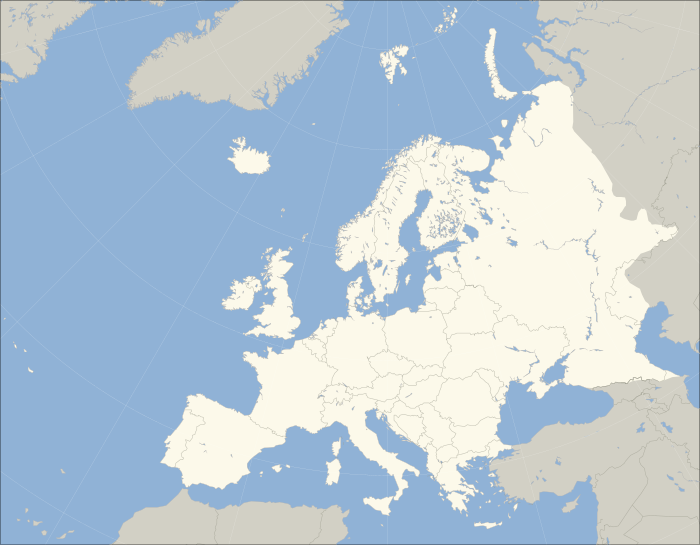 Alb. And. Austria Armenia Azer. Belarus Belgium BiH Bulgaria Croatia Cyprus Czech Rep. Denmark Estonia Finland France Germany Georgia Greece Greenland (Dk) Hungary Iceland Ireland Italy S. Mar. Kazakhstan Kos. Latvia Liech. Lithuania Lux. Mac. Malta Moldova Mon. Mont. Neth. Norway Svalbard (Nor) Poland Portugal Romania Russia Serbia Slovakia Slo. Spain Sweden Switz- erland Turkey Ukraine United Kingdom Far. (Dk) Vat. Adr- iatic Sea Arctic Ocean Baltic Sea Aegean Sea Barents Sea Bay of Biscay Black Sea Azov Sea Caspian Sea Celtic Sea Greenland Sea Baffin Bay Gulf of Cadiz Ligurian Sea Mediterranean Sea North Atlantic Ocean North Sea Norwegian Sea Strait of Gibraltar Etymology In ancient Greek mythology, Europa was a Phoenician princess whom Zeus abducted after assuming the form of a dazzling white bull. He took her to the island of Crete where she gave birth to Minos, Rhadamanthus and Sarpedon. For Homer, Europe (Greek: Εὐρώπη, Eurṓpē; see also List of Greek place names) was a mythological queen of Crete, not a geographical designation. Later, Europa stood for central-north Greece, and by 500 BC its meaning had been extended to the lands to the north. The name of Europa is of uncertain etymology.[24] One theory suggests that it is derived from the Greek roots meaning broad (εὐρ(υ)- eur(u)-) and eye (ὤψ/ὠπ-/ὀπτ- ōps/ōp-/op(t)-), hence Eurṓpē, "wide-gazing", "broad of aspect" (compare with glaukōpis (γλαυκῶπις 'grey-eyed') Athena or boōpis (βοὠπις 'ox-eyed') Hera). Broad has been an epithet of Earth itself in the reconstructed Proto-Indo-European religion.[25] Another theory suggests that it is actually based on a Semitic word such as the Akkadian erebu meaning "to go down, set" (cf. Occident),[26] cognate to Phoenician 'ereb "evening; west" and Arabic Maghreb, Hebrew ma'ariv (see also Erebus, PIE *h1regʷos, "darkness"). However, M. L. West states that "phonologically, the match between Europa's name and any form of the Semitic word is very poor".[27] Most major world languages use words derived from "Europa" to refer to the "continent" (peninsula). Chinese, for example, uses the word Ōuzhōu (歐洲), which is an abbreviation of the transliterated name Ōuluóbā zhōu (歐羅巴洲); this term is also used by the European Union in Japanese-language diplomatic relations, despite the katakana Yōroppa (ヨーロッパ?) being more commonly used. However, in some Turkic languages the originally Persian name Frangistan (land of the Franks) is used casually in referring to much of Europe, besides official names such as Avrupa or Evropa.[28] History Main article: History of Europe Prehistory Main article: Prehistoric Europe   Ġgantija, Malta   The Lady of Vinča, neolithic pottery from Serbia   Stonehenge, a prehistoric monument in the United Kingdom   The Nebra sky disk from Bronze age Germany Homo georgicus, which lived roughly 1.8 million years ago in Georgia, is the earliest hominid to have been discovered in Europe.[29] Other hominid remains, dating back roughly 1 million years, have been discovered in Atapuerca, Spain.[30] Neanderthal man (named for the Neandertal valley in Germany) appeared in Europe 150,000 years ago and disappeared from the fossil record about 30,000 years ago. The Neanderthals were supplanted by modern humans (Cro-Magnons), who appeared in Europe around 40,000 years ago.[31] The European Neolithic period—marked by the cultivation of crops and the raising of livestock, increased numbers of settlements and the widespread use of pottery—began around 7000 BC in Greece and the Balkans, probably influenced by earlier farming practices in Anatolia and the Near East. It spread from South Eastern Europe along the valleys of the Danube and the Rhine (Linear Pottery culture) and along the Mediterranean coast (Cardial culture). Between 4500 and 3000 BC, these central European neolithic cultures developed further to the west and the north, transmitting newly acquired skills in producing copper artefacts. In Western Europe the Neolithic period was characterized not by large agricultural settlements but by field monuments, such as causewayed enclosures, burial mounds and megalithic tombs.[32] The Corded Ware cultural horizon flourished at the transition from the Neolithic to the Chalcolithic. During this period giant megalithic monuments, such as the Megalithic Temples of Malta and Stonehenge, were constructed throughout Western and Southern Europe.[33][34] The European Bronze Age began in the late 3rd millennium BC with the Beaker culture. The European Iron Age began around 800 BC, with the Hallstatt culture. Iron Age colonisation by the Phoenicians gave rise to early Mediterranean cities. Early Iron Age Italy and Greece from around the 8th century BC gradually gave rise to historical Classical antiquity. Classical antiquity Main article: Classical antiquity See also: Ancient Greece and Ancient Rome   The Greek Temple of Apollo, Paestum, Italy Ancient Greece had a profound impact on Western civilisation. Western democratic and individualistic culture are often attributed to Ancient Greece.[35] The Greeks invented the polis, or city-state, which played a fundamental role in their concept of identity.[36] These Greek political ideals were rediscovered in the late 18th century by European philosophers and idealists. Greece also generated many cultural contributions: in philosophy, humanism and rationalism under Aristotle, Socrates and Plato; in history with Herodotus and Thucydides; in dramatic and narrative verse, starting with the epic poems of Homer;[35] and in science with Pythagoras, Euclid and Archimedes.[37][38][39]   The Roman Empire at its greatest extent Another major influence on Europe came from the Roman Empire which left its mark on law, language, engineering, architecture, and government.[40] During the pax romana, the Roman Empire expanded to encompass the entire Mediterranean Basin and much of Europe.[41] Stoicism influenced Roman emperors such as Hadrian, Antoninus Pius, and Marcus Aurelius, who all spent time on the Empire's northern border fighting Germanic, Pictish and Scottish tribes.[42][43] Christianity was eventually legitimised by Constantine I after three centuries of imperial persecution. Early Middle Ages Main articles: Late Antiquity and Early Middle Ages See also: Dark Ages (historiography) and Age of Migrations   Roland pledges fealty to Charlemagne, Holy Roman Emperor. During the decline of the Roman Empire, Europe entered a long period of change arising from what historians call the "Age of Migrations". There were numerous invasions and migrations amongst the Ostrogoths, Visigoths, Goths, Vandals, Huns, Franks, Angles, Saxons, Slavs, Avars, Bulgars and, later still, the Vikings and Magyars.[41] Renaissance thinkers such as Petrarch would later refer to this as the "Dark Ages".[44] Isolated monastic communities were the only places to safeguard and compile written knowledge accumulated previously; apart from this very few written records survive and much literature, philosophy, mathematics, and other thinking from the classical period disappeared from Europe.[45] During the Dark Ages, the Western Roman Empire fell under the control of various tribes. The Germanic and Slav tribes established their domains over Western and Eastern Europe respectively.[46] Eventually the Frankish tribes were united under Clovis I.[47] Charlemagne, a Frankish king of the Carolingian dynasty who had conquered most of Western Europe, was anointed "Holy Roman Emperor" by the Pope in 800. This led to the founding of the Holy Roman Empire, which eventually became centred in the German principalities of central Europe.[48] The predominantly Greek speaking Eastern Roman Empire became known in the west as the Byzantine Empire. Its capital was Constantinople. Emperor Justinian I presided over Constantinople's first golden age: he established a legal code, funded the construction of the Hagia Sophia and brought the Christian church under state control.[49] Fatally weakened by the sack of Constantinople during the Fourth Crusade, the Byzantines fell in 1453 when they were conquered by the Ottoman Empire.[50] Middle Ages Main articles: High Middle Ages, Late Middle Ages, and Middle Ages See also: Medieval demography The economic growth of Europe around the year 1000, together with the lack of safety on the mainland trading routes, made possible the development of major commercial routes along the coast of the Mediterranean Sea. In this context, the growing independence acquired by some coastal cities gave the Maritime Republics a leading role in the European scene.   Richard I and Philip II, during the Third Crusade The Middle Ages on the mainland were dominated by the two upper echelons of the social structure: the nobility and the clergy. Feudalism developed in France in the Early Middle Ages and soon spread throughout Europe.[51] A struggle for influence between the nobility and the monarchy in England led to the writing of the Magna Carta and the establishment of a parliament.[52] The primary source of culture in this period came from the Roman Catholic Church. Through monasteries and cathedral schools, the Church was responsible for education in much of Europe.[51] The Papacy reached the height of its power during the High Middle Ages. A East-West Schism in 1054 split the former Roman Empire religiously, with the Eastern Orthodox Church in the Byzantine Empire and the Roman Catholic Church in the former Western Roman Empire. In 1095 Pope Urban II called for a crusade against Muslims occupying Jerusalem and the Holy Land.[53] In Europe itself, the Church organised the Inquisition against heretics. In Spain, the Reconquista concluded with the fall of Granada in 1492, ending over seven centuries of Muslim presence in the Iberian Peninsula.[54] 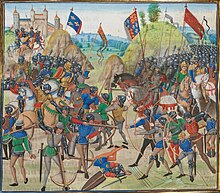  The Battle of Crécy in 1346, from a manuscript of Jean Froissart's Chronicles; the battle established England as a military power. In the 11th and 12th centuries, constant incursions by nomadic Turkic tribes, such as the Pechenegs and the Kipchaks, caused a massive migration of Slavic populations to the safer, heavily forested regions of the north.[55] Like many other parts of Eurasia, these territories were overrun by the Mongols.[56] The invaders, later known as Tatars, formed the state of the Golden Horde, which ruled the southern and central expanses of Russia for over three centuries.[57] The Great Famine of 1315–1317 was the first crisis that would strike Europe in the late Middle Ages.[58] The period between 1348 and 1420 witnessed the heaviest loss. The population of France was reduced by half.[59][60] Medieval Britain was afflicted by 95 famines,[61] and France suffered the effects of 75 or more in the same period.[62] Europe was devastated in the mid-14th century by the Black Death, one of the most deadly pandemics in human history which killed an estimated 25 million people in Europe alone—a third of the European population at the time.[63] The plague had a devastating effect on Europe's social structure; it induced people to live for the moment as illustrated by Giovanni Boccaccio in The Decameron (1353). It was a serious blow to the Roman Catholic Church and led to increased persecution of Jews, foreigners, beggars and lepers.[64] The plague is thought to have returned every generation with varying virulence and mortalities until the 18th century.[65] During this period, more than 100 plague epidemics swept across Europe.[66] Early modern period Main article: Early modern period See also: Renaissance, Protestant Reformation, Scientific Revolution, and Age of Discovery   The School of Athens by Raphael: Contemporaries such as Michelangelo and Leonardo da Vinci (centre) are portrayed as classical scholars   Battle of Vienna in 1683 broke the advance of the Ottoman Empire into Europe The Renaissance was a period of cultural change originating in Florence and later spreading to the rest of Europe. in the 14th century. The rise of a new humanism was accompanied by the recovery of forgotten classical Greek and Arabic knowledge from monastic libraries, often re-translanted from Arabic into Latin.[67][68][69] The Renaissance spread across Europe between the 14th and 16th centuries: it saw the flowering of art, philosophy, music, and the sciences, under the joint patronage of royalty, the nobility, the Roman Catholic Church, and an emerging merchant class.[70][71][72] Patrons in Italy, including the Medici family of Florentine bankers and the Popes in Rome, funded prolific quattrocento and cinquecento artists such as Raphael, Michelangelo, and Leonardo da Vinci.[73][74] Political intrigue within the Church in the mid-14th century caused the Great Schism. During this forty-year period, two popes—one in Avignon and one in Rome—claimed rulership over the Church. Although the schism was eventually healed in 1417, the papacy's spiritual authority had suffered greatly.[75] The Church's power was further weakened by the Protestant Reformation (1517–1648), initially sparked by the works of German theologian Martin Luther, a result of the lack of reform within the Church. The Reformation also damaged the Holy Roman Empire's power, as German princes became divided between Protestant and Roman Catholic faiths.[76] This eventually led to the Thirty Years War (1618–1648), which crippled the Holy Roman Empire and devastated much of Germany, killing between 25 and 40 percent of its population.[77] In the aftermath of the Peace of Westphalia, France rose to predominance within Europe.[78] The 17th century in southern and eastern Europe was a period of general decline.[79] Eastern Europe experienced more than 150 famines in a 200-year period between 1501 to 1700.[80] The Renaissance and the New Monarchs marked the start of an Age of Discovery, a period of exploration, invention, and scientific development.[81] According to Peter Barrett, "It is widely accepted that 'modern science' arose in the Europe of the 17th century (towards the end of the Renaissance), introducing a new understanding of the natural world."[67] In the 15th century, Portugal and Spain, two of the greatest naval powers of the time, took the lead in exploring the world.[82][83] Christopher Columbus reached the New World in 1492, and soon after the Spanish and Portuguese began establishing colonial empires in the Americas.[84] France, the Netherlands and England soon followed in building large colonial empires with vast holdings in Africa, the Americas, and Asia. 18th and 19th centuries Main article: Modern history See also: Industrial Revolution, French Revolution, and Age of Enlightenment The Age of Enlightenment was a powerful intellectual movement during the 18th century promoting scientific and reason-based thoughts.[85][86][87] Discontent with the aristocracy and clergy's monopoly on political power in France resulted in the French Revolution and the establishment of the First Republic as a result of which the monarchy and many of the nobility perished during the initial reign of terror.[88] Napoleon Bonaparte rose to power in the aftermath of the French Revolution and established the First French Empire that, during the Napoleonic Wars, grew to encompass large parts of Europe before collapsing in 1815 with the Battle of Waterloo.[89][90]   Napoleon's Empire in 1811 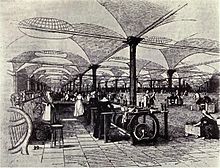  The Industrial Revolution started in Great Britain Napoleonic rule resulted in the further dissemination of the ideals of the French Revolution, including that of the nation-state, as well as the widespread adoption of the French models of administration, law, and education.[91][92][93] The Congress of Vienna, convened after Napoleon's downfall, established a new balance of power in Europe centred on the five "Great Powers": the United Kingdom, France, Prussia, Habsburg Austria, and Russia.[94] This balance would remain in place until the Revolutions of 1848, during which liberal uprisings affected all of Europe except for Russia and the United Kingdom. These revolutions were eventually put down by conservative elements and few reforms resulted.[95] In 1867, the Austro-Hungarian empire was formed; and 1871 saw the unifications of both Italy and Germany as nation-states from smaller principalities.[96] Likewise, in 1878 the Congress of Berlin has conveyed formal recognition to the de facto independent principalities of Montenegro, Serbia and Romania. The Industrial Revolution started in Great Britain in the last part of the 18th century and spread throughout Europe. The invention and implementation of new technologies resulted in rapid urban growth, mass employment, and the rise of a new working class.[97] Reforms in social and economic spheres followed, including the first laws on child labour, the legalisation of trade unions,[98] and the abolition of slavery.[99] In Britain, the Public Health Act 1875 was passed, which significantly improved living conditions in many British cities.[100] Europe’s population population increased from about 100 million in 1700 to 400 million by 1900.[101] In the 19th century, 70 million people left Europe in migrations to various European colonies abroad and to the United States.[102] 20th century to present Main articles: Modern era and History of Europe See also: World War I, Great Depression, Interwar period, World War II, Cold War, and History of the European Union 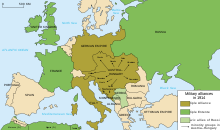  European military alliances just prior to the start of WWI Two World Wars and an economic depression dominated the first half of the 20th century. World War I was fought between 1914 and 1918. It started when Archduke Franz Ferdinand of Austria was assassinated by the Bosnian Serb Gavrilo Princip.[103] Most European nations were drawn into the war, which was fought between the Entente Powers (France, Belgium, Serbia, Portugal, Russia, the United Kingdom, and later Italy, Greece, Romania, and the United States) and the Central Powers (Austria-Hungary, Germany, Bulgaria, and the Ottoman Empire). The War left more than 16 million civilians and military dead.[104] Over 60 million European soldiers were mobilised from 1914–1918.[105] Partly as a result of its defeat Russia was plunged into the Russian Revolution, which threw down the Tsarist monarchy and replaced it with the communist Soviet Union.[106] Austria-Hungary and the Ottoman Empire collapsed and broke up into separate nations, and many other nations had their borders redrawn. The Treaty of Versailles, which officially ended World War I in 1919, was harsh towards Germany, upon whom it placed full responsibility for the war and imposed heavy sanctions.[107] Economic instability, caused in part by debts incurred in the First World War and 'loans' to Germany played havoc in Europe in the late 1920s and 1930s. This and the Wall Street Crash of 1929 brought about the worldwide Great Depression. Helped by the economic crisis, social instability and the threat of communism, fascist movements developed throughout Europe placing Adolf Hitler of Nazi Germany, Francisco Franco of Spain and Benito Mussolini of Italy in power.[108][109] Up to eight million people may have died in the Soviet famine of 1932–33.[110] Stalin's Great Terror began in December 1934. By the time the purges subsided in 1938, millions of Soviet citizens had been executed, imprisoned, or exiled.[111] In 1933, Hitler became the leader of Germany and began to work towards his goal of building Greater Germany. Germany re-expanded and took back the Saarland and Rhineland in 1935 and 1936. In 1938, Austria became a part of Germany too, following the Anschluss. Later that year, Germany annexed the German Sudetenland, which had become a part of Czechoslovakia after the war. This move was highly contested by the other powers, but ultimately permitted in the hopes of avoiding war and appeasing Hitler.   Burned-out buildings in Hamburg, 1944 or 45. Shortly afterwards, Poland and Hungary started to press for the annexation of parts of Czechoslovakia with Polish and Hungarian majorities. Hitler encouraged the Slovaks to do the same and in early 1939, the remainder of Czechoslovakia was split into the Protectorate of Bohemia and Moravia, controlled by Germany, and the Slovak Republic, while other smaller regions went to Poland and Hungary. With tensions mounting between Germany and Poland over the future of Danzig, the Germans turned to the Soviets, and signed the Molotov-Ribbentrop Pact. Germany invaded Poland on 1 September 1939, prompting France and the United Kingdom to declare war on Germany on 3 September, opening the European theatre of World War II.[112][113] The Soviet invasion of Poland started on 17 September and Poland fell soon thereafter. On 24 September, the Soviet Union attacked the Baltic countries and later, Finland. The British hoped to land at Narvik and send troops to aid Finland, but their primary objective in the landing was to encircle Germany and cut the Germans off from Scandinavian resources. Nevertheless, the Germans knew of Britain's plans and got to Narvik first, repulsing the attack. Around the same time, Germany moved troops into Denmark, which left no room for a front except for where the last war had been fought or by landing at sea. The Phoney War continued. In May 1940, Germany attacked France through the Low Countries. France capitulated in June 1940. However, the British refused to negotiate peace terms with the Germans and the war continued. By August Germany began a bombing offensive on Britain, but failed to convince the Britons to give up.[114] In 1941, Germany invaded the Soviet Union in the ultimately unsuccessful Operation Barbarossa.[115] On 7 December 1941 Japan's attack on Pearl Harbor drew the United States into the conflict as allies of the British Empire and other allied forces.[116][117] After the staggering Battle of Stalingrad in 1943, the German offensive in the Soviet Union turned into a continual fallback. In 1944, British and American forces invaded France in the D-Day landings, opening a new front against Germany. Berlin finally fell in 1945, ending World War II in Europe. The war was the largest and most destructive in human history, with 60 million dead across the world.[118] More than 40 million people in Europe had died as a result of the war by the time World War II ended,[119] including between 11 and 17 million people who perished during the Holocaust.[120] The Soviet Union lost around 27 million people during the war, about half of all World War II casualties.[121] By the end of World War II, Europe had more than 40 million refugees.[122] Several post-war expulsions in Central and Eastern Europe displaced a total of about 20 million people.[123] 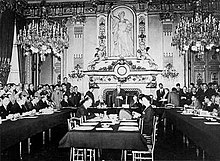  The Schuman Declaration (9 May 1950) led to the creation of the European Coal and Steel Community. It began the integration process which today comprises the European Union of 27 democratic countries in Europe |
I bet I meant post in this thread. :lol
|
part of page 2 and page 3 are the best things about this thread. go back to posting cats.
|
that should be a new item at McDonald's the Royal Snatch wit cheese
|
The term "The Royal Snatch" is much more funny if in your head you read it with an impersonation of the queen
|
     DID I ALREADY PSOT THAT ONE? IF I DID OOSP BUT IF NOT HERE IT IS AGAIN :)   I DONT KNOW IF THIS IS A CAT BUT I POST ABNYWAYS :)    IF U WANT MOR CATS JUST QUOT=E MY POST AND ONLY TYPE "1" IF YO DONT TYPE "1" THEN I WONT KNOW AND YOU'LL JUST HAVE TIO TRY AGIAN |
my face when it's thrash0 who somehow saves an awful thread
 |
I bet Chojin is right. :(
|
I bet Pram Maven would love this thread. :eek
|
i don't even understand
|
more cats.
|
                                             |
 |
I bet you don't know what a real kitten looks like
|
Quote:
         :3 I CANT FIND BIGGER ONES >: |
 It's so fucking adorable, I could blast it in the face with a flamethrower! I bet no one is winning this game :( |
Fathom Zero wins yay you get a prize :) per George
|
Is it pr0n? Involving shellfish? Prawn pr0n?
|
nah I got allergies...
|
Quote:
:chuckleworthy:chuckleworthy:chuckleworthy:chuckle worthy:chuckleworthy:chuckleworthy:chuckleworthy:c huckleworthy:chuckleworthy :chuckleworthy:chuckleworthy:chuckleworthy:chuckle worthy:chuckleworthy:chuckleworthy:chuckleworthy:c huckleworthy:chuckleworthy :chuckleworthy:chuckleworthy:chuckleworthy:chuckle worthy:chuckleworthy:chuckleworthy:chuckleworthy:c huckleworthy:chuckleworthy :chuckleworthy:chuckleworthy:chuckleworthy:chuckle worthy:chuckleworthy:chuckleworthy:chuckleworthy:c huckleworthy:chuckleworthy :chuckleworthy:chuckleworthy:chuckleworthy:chuckle worthy:chuckleworthy:chuckleworthy:chuckleworthy:c huckleworthy:chuckleworthy :chuckleworthy:chuckleworthy:chuckleworthy:chuckle worthy:chuckleworthy:chuckleworthy:chuckleworthy:c huckleworthy:chuckleworthy :chuckleworthy:chuckleworthy:chuckleworthy:chuckle worthy:chuckleworthy:chuckleworthy:chuckleworthy:c huckleworthy:chuckleworthy :chuckleworthy:chuckleworthy:chuckleworthy:chuckle worthy:chuckleworthy:chuckleworthy:chuckleworthy:c huckleworthy:chuckleworthy :chuckleworthy:chuckleworthy:chuckleworthy:chuckle worthy:chuckleworthy:chuckleworthy:chuckleworthy:c huckleworthy:chuckleworthy :chuckleworthy:chuckleworthy:chuckleworthy:chuckle worthy:chuckleworthy:chuckleworthy:chuckleworthy:c huckleworthy:chuckleworthy :chuckleworthy:chuckleworthy:chuckleworthy:chuckle worthy:chuckleworthy:chuckleworthy:chuckleworthy:c huckleworthy:chuckleworthy :chuckleworthy:chuckleworthy:chuckleworthy:chuckle worthy:chuckleworthy:chuckleworthy:chuckleworthy:c huckleworthy:chuckleworthy :chuckleworthy:chuckleworthy:chuckleworthy:chuckle worthy:chuckleworthy:chuckleworthy:chuckleworthy:c huckleworthy:chuckleworthy :chuckleworthy:chuckleworthy:chuckleworthy:chuckle worthy:chuckleworthy:chuckleworthy:chuckleworthy:c huckleworthy:chuckleworthy :chuckleworthy:chuckleworthy:chuckleworthy:chuckle worthy:chuckleworthy:chuckleworthy:chuckleworthy:c huckleworthy:chuckleworthy :chuckleworthy:chuckleworthy:chuckleworthy:chuckle worthy:chuckleworthy:chuckleworthy:chuckleworthy:c huckleworthy:chuckleworthy :chuckleworthy:chuckleworthy:chuckleworthy:chuckle worthy:chuckleworthy:chuckleworthy:chuckleworthy:c huckleworthy:chuckleworthy :chuckleworthy:chuckleworthy:chuckleworthy:chuckle worthy:chuckleworthy:chuckleworthy:chuckleworthy:c huckleworthy:chuckleworthy :chuckleworthy:chuckleworthy:chuckleworthy:chuckle worthy:chuckleworthy:chuckleworthy:chuckleworthy:c huckleworthy:chuckleworthy :chuckleworthy:chuckleworthy:chuckleworthy:chuckle worthy:chuckleworthy:chuckleworthy:chuckleworthy:c huckleworthy:chuckleworthy :chuckleworthy:chuckleworthy:chuckleworthy:chuckle worthy:chuckleworthy:chuckleworthy:chuckleworthy:c huckleworthy:chuckleworthy :chuckleworthy:chuckleworthy:chuckleworthy:chuckle worthy:chuckleworthy:chuckleworthy:chuckleworthy:c huckleworthy:chuckleworthy :chuckleworthy:chuckleworthy:chuckleworthy:chuckle worthy:chuckleworthy:chuckleworthy:chuckleworthy:c huckleworthy:chuckleworthy :chuckleworthy:chuckleworthy:chuckleworthy:chuckle worthy:chuckleworthy:chuckleworthy:chuckleworthy:c huckleworthy:chuckleworthy :chuckleworthy:chuckleworthy:chuckleworthy:chuckle worthy:chuckleworthy:chuckleworthy:chuckleworthy:c huckleworthy:chuckleworthy :chuckleworthy:chuckleworthy:chuckleworthy:chuckle worthy:chuckleworthy:chuckleworthy:chuckleworthy:c huckleworthy:chuckleworthy :chuckleworthy:chuckleworthy:chuckleworthy:chuckle worthy:chuckleworthy:chuckleworthy:chuckleworthy:c huckleworthy:chuckleworthy :chuckleworthy:chuckleworthy:chuckleworthy:chuckle worthy:chuckleworthy:chuckleworthy:chuckleworthy:c huckleworthy:chuckleworthy :chuckleworthy:chuckleworthy:chuckleworthy:chuckle worthy:chuckleworthy:chuckleworthy:chuckleworthy:c huckleworthy:chuckleworthy :chuckleworthy:chuckleworthy:chuckleworthy:chuckle worthy:chuckleworthy:chuckleworthy:chuckleworthy:c huckleworthy:chuckleworthy :chuckleworthy:chuckleworthy:chuckleworthy:chuckle worthy:chuckleworthy:chuckleworthy:chuckleworthy:c huckleworthy:chuckleworthy :chuckleworthy:chuckleworthy:chuckleworthy:chuckle worthy:chuckleworthy:chuckleworthy:chuckleworthy:c huckleworthy:chuckleworthy :chuckleworthy:chuckleworthy:chuckleworthy:chuckle worthy:chuckleworthy:chuckleworthy:chuckleworthy:c huckleworthy:chuckleworthy :chuckleworthy:chuckleworthy:chuckleworthy:chuckle worthy:chuckleworthy:chuckleworthy:chuckleworthy:c huckleworthy:chuckleworthy :chuckleworthy:chuckleworthy:chuckleworthy:chuckle worthy:chuckleworthy:chuckleworthy:chuckleworthy:c huckleworthy:chuckleworthy :chuckleworthy:chuckleworthy:chuckleworthy:chuckle worthy:chuckleworthy:chuckleworthy:chuckleworthy:c huckleworthy:chuckleworthy :chuckleworthy:chuckleworthy:chuckleworthy:chuckle worthy:chuckleworthy:chuckleworthy:chuckleworthy:c huckleworthy:chuckleworthy :chuckleworthy:chuckleworthy:chuckleworthy:chuckle worthy:chuckleworthy:chuckleworthy:chuckleworthy:c huckleworthy:chuckleworthy :chuckleworthy:chuckleworthy:chuckleworthy:chuckle worthy:chuckleworthy:chuckleworthy:chuckleworthy:c huckleworthy:chuckleworthy :chuckleworthy:chuckleworthy:chuckleworthy:chuckle worthy:chuckleworthy:chuckleworthy:chuckleworthy:c huckleworthy:chuckleworthy :chuckleworthy:chuckleworthy:chuckleworthy:chuckle worthy:chuckleworthy:chuckleworthy:chuckleworthy:c huckleworthy:chuckleworthy :chuckleworthy:chuckleworthy:chuckleworthy:chuckle worthy:chuckleworthy:chuckleworthy:chuckleworthy:c huckleworthy:chuckleworthy :chuckleworthy:chuckleworthy:chuckleworthy:chuckle worthy:chuckleworthy:chuckleworthy:chuckleworthy:c huckleworthy:chuckleworthy :chuckleworthy:chuckleworthy:chuckleworthy:chuckle worthy:chuckleworthy:chuckleworthy:chuckleworthy:c huckleworthy:chuckleworthy :chuckleworthy:chuckleworthy:chuckleworthy:chuckle worthy:chuckleworthy:chuckleworthy:chuckleworthy:c huckleworthy:chuckleworthy :chuckleworthy:chuckleworthy:chuckleworthy:chuckle worthy:chuckleworthy:chuckleworthy:chuckleworthy:c huckleworthy:chuckleworthy :chuckleworthy:chuckleworthy:chuckleworthy:chuckle worthy:chuckleworthy:chuckleworthy:chuckleworthy:c huckleworthy:chuckleworthy :chuckleworthy:chuckleworthy:chuckleworthy:chuckle worthy:chuckleworthy:chuckleworthy:chuckleworthy:c huckleworthy:chuckleworthy :chuckleworthy:chuckleworthy:chuckleworthy:chuckle worthy:chuckleworthy:chuckleworthy:chuckleworthy:c huckleworthy:chuckleworthy :chuckleworthy:chuckleworthy:chuckleworthy:chuckle worthy:chuckleworthy:chuckleworthy:chuckleworthy:c huckleworthy:chuckleworthy :chuckleworthy:chuckleworthy:chuckleworthy:chuckle worthy:chuckleworthy:chuckleworthy:chuckleworthy:c huckleworthy:chuckleworthy :chuckleworthy:chuckleworthy:chuckleworthy:chuckle worthy:chuckleworthy:chuckleworthy:chuckleworthy:c huckleworthy:chuckleworthy :chuckleworthy:chuckleworthy:chuckleworthy:chuckle worthy:chuckleworthy:chuckleworthy:chuckleworthy:c huckleworthy:chuckleworthy :chuckleworthy:chuckleworthy:chuckleworthy:chuckle worthy:chuckleworthy:chuckleworthy:chuckleworthy:c huckleworthy:chuckleworthy :chuckleworthy:chuckleworthy:chuckleworthy:chuckle worthy:chuckleworthy:chuckleworthy:chuckleworthy:c huckleworthy:chuckleworthy :chuckleworthy:chuckleworthy:chuckleworthy:chuckle worthy:chuckleworthy:chuckleworthy:chuckleworthy:c huckleworthy:chuckleworthy :chuckleworthy:chuckleworthy:chuckleworthy:chuckle worthy:chuckleworthy:chuckleworthy:chuckleworthy:c huckleworthy:chuckleworthy :chuckleworthy:chuckleworthy:chuckleworthy:chuckle worthy:chuckleworthy:chuckleworthy:chuckleworthy:c huckleworthy:chuckleworthy :chuckleworthy:chuckleworthy:chuckleworthy:chuckle worthy:chuckleworthy:chuckleworthy:chuckleworthy:c huckleworthy:chuckleworthy :chuckleworthy:chuckleworthy:chuckleworthy:chuckle worthy:chuckleworthy:chuckleworthy:chuckleworthy:c huckleworthy:chuckleworthy :chuckleworthy:chuckleworthy:chuckleworthy:chuckle worthy:chuckleworthy:chuckleworthy:chuckleworthy:c huckleworthy:chuckleworthy :chuckleworthy:chuckleworthy:chuckleworthy:chuckle worthy:chuckleworthy:chuckleworthy:chuckleworthy:c huckleworthy:chuckleworthy :chuckleworthy:chuckleworthy:chuckleworthy:chuckle worthy:chuckleworthy:chuckleworthy:chuckleworthy:c huckleworthy:chuckleworthy :chuckleworthy:chuckleworthy:chuckleworthy:chuckle worthy:chuckleworthy:chuckleworthy:chuckleworthy:c huckleworthy:chuckleworthy :chuckleworthy:chuckleworthy:chuckleworthy:chuckle worthy:chuckleworthy:chuckleworthy:chuckleworthy:c huckleworthy:chuckleworthy :chuckleworthy:chuckleworthy:chuckleworthy:chuckle worthy:chuckleworthy:chuckleworthy:chuckleworthy:c huckleworthy:chuckleworthy :chuckleworthy:chuckleworthy:chuckleworthy:chuckle worthy:chuckleworthy:chuckleworthy:chuckleworthy:c huckleworthy:chuckleworthy :chuckleworthy:chuckleworthy:chuckleworthy:chuckle worthy:chuckleworthy:chuckleworthy:chuckleworthy:c huckleworthy:chuckleworthy :chuckleworthy:chuckleworthy:chuckleworthy:chuckle worthy:chuckleworthy:chuckleworthy:chuckleworthy:c huckleworthy:chuckleworthy :chuckleworthy:chuckleworthy:chuckleworthy:chuckle worthy:chuckleworthy:chuckleworthy:chuckleworthy:c huckleworthy:chuckleworthy :chuckleworthy:chuckleworthy:chuckleworthy:chuckle worthy:chuckleworthy:chuckleworthy:chuckleworthy:c huckleworthy:chuckleworthy :chuckleworthy:chuckleworthy:chuckleworthy:chuckle worthy:chuckleworthy:chuckleworthy:chuckleworthy:c huckleworthy:chuckleworthy :chuckleworthy:chuckleworthy:chuckleworthy:chuckle worthy:chuckleworthy:chuckleworthy:chuckleworthy:c huckleworthy:chuckleworthy :chuckleworthy:chuckleworthy:chuckleworthy:chuckle worthy:chuckleworthy:chuckleworthy:chuckleworthy:c huckleworthy:chuckleworthy :chuckleworthy:chuckleworthy:chuckleworthy:chuckle worthy:chuckleworthy:chuckleworthy:chuckleworthy:c huckleworthy:chuckleworthy :chuckleworthy:chuckleworthy:chuckleworthy:chuckle worthy:chuckleworthy:chuckleworthy:chuckleworthy:c huckleworthy:chuckleworthy :chuckleworthy:chuckleworthy:chuckleworthy:chuckle worthy:chuckleworthy:chuckleworthy:chuckleworthy:c huckleworthy:chuckleworthy :chuckleworthy:chuckleworthy:chuckleworthy:chuckle worthy:chuckleworthy:chuckleworthy:chuckleworthy:c huckleworthy:chuckleworthy :chuckleworthy:chuckleworthy:chuckleworthy:chuckle worthy:chuckleworthy:chuckleworthy:chuckleworthy:c huckleworthy:chuckleworthy :chuckleworthy:chuckleworthy:chuckleworthy:chuckle worthy:chuckleworthy:chuckleworthy:chuckleworthy:c huckleworthy:chuckleworthy :chuckleworthy:chuckleworthy:chuckleworthy:chuckle worthy:chuckleworthy:chuckleworthy:chuckleworthy:c huckleworthy:chuckleworthy :chuckleworthy:chuckleworthy:chuckleworthy:chuckle worthy:chuckleworthy:chuckleworthy:chuckleworthy:c huckleworthy:chuckleworthy :chuckleworthy:chuckleworthy:chuckleworthy:chuckle worthy:chuckleworthy:chuckleworthy:chuckleworthy:c huckleworthy:chuckleworthy :chuckleworthy:chuckleworthy:chuckleworthy:chuckle worthy:chuckleworthy:chuckleworthy:chuckleworthy:c huckleworthy:chuckleworthy :chuckleworthy:chuckleworthy:chuckleworthy:chuckle worthy:chuckleworthy:chuckleworthy:chuckleworthy:c huckleworthy:chuckleworthy :chuckleworthy:chuckleworthy:chuckleworthy:chuckle worthy:chuckleworthy:chuckleworthy:chuckleworthy:c huckleworthy:chuckleworthy :chuckleworthy:chuckleworthy:chuckleworthy:chuckle worthy:chuckleworthy:chuckleworthy:chuckleworthy:c huckleworthy:chuckleworthy :chuckleworthy:chuckleworthy:chuckleworthy:chuckle worthy:chuckleworthy:chuckleworthy:chuckleworthy:c huckleworthy:chuckleworthy :chuckleworthy:chuckleworthy:chuckleworthy:chuckle worthy:chuckleworthy:chuckleworthy:chuckleworthy:c huckleworthy:chuckleworthy :chuckleworthy:chuckleworthy:chuckleworthy:chuckle worthy:chuckleworthy:chuckleworthy:chuckleworthy:c huckleworthy:chuckleworthy :chuckleworthy:chuckleworthy:chuckleworthy:chuckle worthy:chuckleworthy:chuckleworthy:chuckleworthy:c huckleworthy:chuckleworthy :chuckleworthy:chuckleworthy:chuckleworthy:chuckle worthy:chuckleworthy:chuckleworthy:chuckleworthy:c huckleworthy:chuckleworthy :chuckleworthy:chuckleworthy:chuckleworthy:chuckle worthy:chuckleworthy:chuckleworthy:chuckleworthy:c huckleworthy:chuckleworthy :chuckleworthy:chuckleworthy:chuckleworthy:chuckle worthy:chuckleworthy:chuckleworthy:chuckleworthy:c huckleworthy:chuckleworthy :chuckleworthy:chuckleworthy:chuckleworthy:chuckle worthy:chuckleworthy:chuckleworthy:chuckleworthy:c huckleworthy:chuckleworthy :chuckleworthy:chuckleworthy:chuckleworthy:chuckle worthy:chuckleworthy:chuckleworthy:chuckleworthy:c huckleworthy:chuckleworthy :chuckleworthy:chuckleworthy:chuckleworthy:chuckle worthy:chuckleworthy:chuckleworthy:chuckleworthy:c huckleworthy:chuckleworthy :chuckleworthy:chuckleworthy:chuckleworthy:chuckle worthy:chuckleworthy:chuckleworthy:chuckleworthy:c huckleworthy:chuckleworthy :chuckleworthy:chuckleworthy:chuckleworthy:chuckle worthy:chuckleworthy:chuckleworthy:chuckleworthy:c huckleworthy:chuckleworthy :chuckleworthy:chuckleworthy:chuckleworthy:chuckle worthy:chuckleworthy:chuckleworthy:chuckleworthy:c huckleworthy:chuckleworthy |
:C HUCKLEWORTHYFINN
|
| All times are GMT -4. The time now is 02:55 AM. |
Powered by: vBulletin
Copyright ©2000 - 2024, Jelsoft Enterprises Ltd.